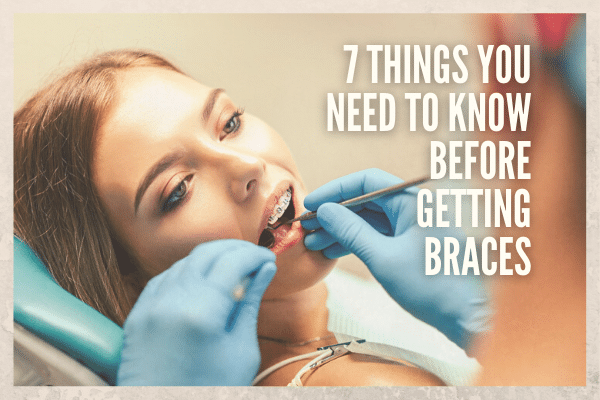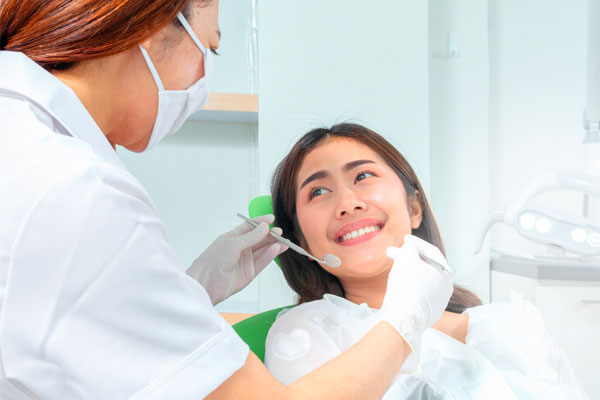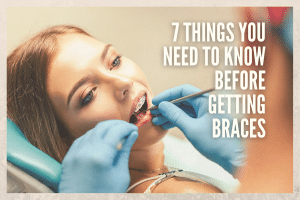So you have decided that you would like to have straight teeth and a beautiful smile, and you are ready to embark on braces treatment. Before you begin your braces journey, here are seven things you may want to know before getting braces for the first time.
1. There Are Different Types Of Braces Treatment.
Braces are teeth straightening appliances used to correct crowded or crooked teeth or a misaligned jaw, or an improper bite. Besides creating a beautiful smile, braces treatment also allows your teeth to bite correctly, thereby improving your overall oral health.
Braces are divided into removable or fixed appliances.
Removable appliances are braces that can be inserted or removed voluntarily by the patient. These include removable plates made of acrylic and stainless steel wires or aligners such as Invisalign.
Fixed appliances are braces that are bonded to the teeth during the active treatment period. They cannot be removed voluntarily by the patients themselves. These typically consist of either metal or ceramic brackets and orthodontic wires.
2. Orthodontists Are Dental Specialist Trained In Teeth And
Jaws Alignment.
Everyone is different and has a unique dentition and bite. Different conditions are treated with various appliances. The best way to provide an accurate and detailed treatment plan for you is to consult your orthodontist.
It is good to ensure that you see a certified Orthodontist, a specialist dental surgeon who specialises in diagnosing, preventing, and treating malpositioned teeth and jaws and misaligned bite patterns.
3. Age Should Not Stop You From Getting Braces.
Contrary to the misconception that you can only wear braces in your teenage years, we see patients as young as seven years to adults here at The Dental Studio. Some adults are even in their 60s!
One is never too old to wear braces as long as you have healthy teeth and gums.
Besides, it is advisable for children as young as seven years old to see your orthodontist for an initial orthodontic consultation. Most children would have several permanent teeth erupted at this age, and common bite problems can be detected and treated if present.
4. Most People Will Experience Discomfort When Wearing Braces.
Braces treatment is generally tolerable. The majority of patients would not even need any pain medication. Your teeth may feel slightly sore the first week after getting braces.
After that, you will need to regularly see your orthodontist for reviews every four to six weeks. Your teeth may feel slightly sore again about one to two days after each review. When your teeth feel sore after an adjustment, it is good to choose softer food options.
Some patients may experience mouth ulcers initially and occasionally. Patients are usually provided with wax relief to help with this. Apply some soft, sticky wax onto your braces brackets to block them out while your ulcer heals.
Some patients may experience increased salivation or altered speech initially after placement of braces. Rest assured, this is only temporary!
5. Getting Teeth Extraction Before Braces May Not Be Necessary.
Some patients may need dental extractions to facilitate braces treatment. If you have protruding teeth or badly overcrowded/overlapping teeth, chances are you will probably need teeth extractions before you can start your braces treatment.
Your orthodontist is the best person to advise you whether there is a need for dental extractions for your case and, if you need, how many and which are the teeth that you will need to extract.
Rest assured that not all cases will need dental extractions before braces treatment.
6. Certain Food Can Damage Braces Components.
With braces, difficult-to-chew foods are not recommended because they can get stuck or damage braces.
Hard food like nuts, chips, and ice can damage braces components like the wires or brackets. Most foods can be enjoyed as usual. However, care should be taken to cut your food into small pieces to facilitate chewing.
Your teeth can be sensitive following your braces appointment. Soft foods such as soups, oatmeal are ideal for the initial few days.
7. Teeth Retainers Are A Lifetime Commitment.
Upon completing your braces treatment, it is crucial to wear your retainers to prevent your teeth from shifting. It is necessary to use retainers until your bite stabilises.
The risk of relapse is very high in the first six months after the removal of your braces. Rotated teeth may take up to a year or more to stabilise after treatment. If you have gaps between your teeth before treatment, you will need permanent retention.
If your teeth move back to their original positions, you will need braces to correct them again! So please wear your teeth retainers well!





